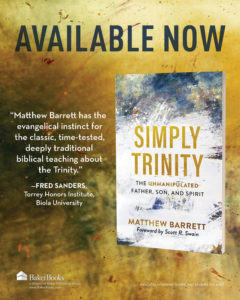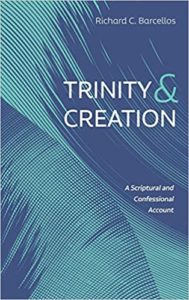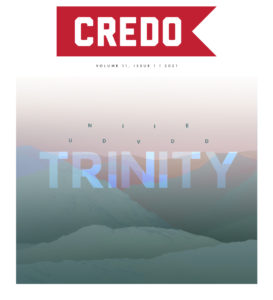At first glance, the reality of creation seems to pose a problem for classical doctrines like divine simplicity and immutability. Did God change at one point from being a potential Creator to being an actual Creator? Does creation not flatly contradict divine immutability? According to Richard C. Barcellos, the church’s confessional witness, and the scriptures they exposit, answer “no.”
In this interview we discuss Barcellos’s new book, Trinity & Creation: A Scriptural and Confessional Account, a defense of the doctrine of creatio ex nihilo in classical Trinitarian perspective, over and against recent revisionist accounts. Richard C. Barcellos is Pastor of Grace Reformed Baptist Church, Palmdale, CA, and Associate Professor of Exegetical Theology at IRBS Theological Seminary.
Could you share with our readers the impetus for your recent book, Trinity & Creation: A Scriptural and Confessional Account. How did this project come about?
Years back I was tasked with giving lectures on the Second London Confession of Faith (1689), specifically chapter 4 (“Of Creation”). I immediately began reading on the issue. The confession says, “In the beginning it pleased God the Father, Son, and Holy Spirit, for the manifestation of the glory of his eternal power, wisdom, and goodness, to Create or make the world, and all things therein…”
As I contemplated this formulation, I became fascinated with two things: first, that creation is a trinitarian act and second, that this one act of creation by the triune God manifests divine power, wisdom, and goodness. As my lectures developed, I soon realized that the topic I was tasked to address was way larger than the lecture time allotted me. After delivering the lectures, I began wondering if the lectures could be turned into a book. So I further developed the lectures and then sent the manuscript out to a few friends, asking if they thought this material was worth developing further. The response was positive so I went back to work for two years, finishing the book around the end of 2018.
Sticking closely to the scriptures, reformed confessions, and seventeenth century theologians, you go into great lengths in this book to emphasize that “Creation” describes all that is not God. In this way, you show that Creation cannot even be comprehended as a coherent concept apart from its relationship to God, and therefore theology proper must precede any meaningful claim about creation. Why is this methodological strategy so important?
Good question, and very important. The issue here really concerns hermeneutics and theological method. Hermeneutics refers to methods of interpreting texts and theological method refers to how we formulate doctrinal assertions. In the book I attempt to show that the Bible itself requires at least two things: first, all scriptural texts come in the context of all other scriptural texts and, second, therefore, all scriptural texts must be factored into any doctrinal assertion. When this is done properly, one realizes that the Bible is written revelation from God who is the eternal Father, Son, and Holy Spirit, given the Bible or not.
This means it is God the Trinity who manifests himself in creation, providence, redemption, and consummation. God effects all that is not God. In order to understand the productions of God, his effects, his works, it is necessary to first understand the God who produces those works. Though we can and do know things about the Creator through his works of creation and providence, we can know God as Trinity only through scripture. As we put together the teaching of Scripture about its triune author, who is also Creator of all, we learn that he is simple, immutable, infinite, eternal, and, therefore, he is these things with or without creation. So, given creation and providence, Scripture teaches us that the God who does these things is the same throughout his various works, and “before” them. This entails that no work of God changes God in any sense.
That being the case, what God does in no way constitutes God as God. Divine works do not make God something he was not without creation. This has massive implications for how we interpret scripture. One of those is that texts which speak of change in God must be filtered through a hermeneutical-theological grid, a grid required by scripture itself. Scripture speaks of God as he is in himself, given creation or not (e.g., “I AM”). This is important to recognize and important to account for. The best way to account for such is to have a scripturally-grounded theology proper (i.e., theologia, divine unity and Trinity) firmly in place as we seek to interpret the economy (i.e., oikonomia) of God as revealed in the written word of God.
Consider one prime example. John 1:1–2 is theologia: “In the beginning was the Word, and the Word was with God, and the Word was God. He was in the beginning with God.” These verses refer readers back of the oikonomia to its trinitarian source, here indicated by two divine persons in transcendent relation without creatures. John 1:3 says, “All things were made through Him, and without Him nothing was made that was made.” These words introduce readers to the oikonomia (i.e., creation), effected by virtue of theologia, though here appropriating creation to the Word or Son. Then in verse 14 we read: “And the Word became flesh and dwelt among us.” Here is the oikonomia narrowly considered—the incarnation of the Word. The order in this passage is very instructive. First theologia then oikonomia. First God in se then God pro nobis.
It may be tempting for most Christians today to assume that creation signifies a change in God. That is, before creation, God did not have the title of “creator” until after that potential title was actualized in the act of creation. And yet, you show seventeenth century theologians like Johannes Wollebius, William Ames, Francis Turretin, and Herman Witsius go out of their way to deny that conclusion. Why is that?
They want to affirm, and I think rightly so, that given creation or not God is immutable. The act of creation does not change God; it brings being into being that did not exist but now does and is in constant flux. The title “Creator” itself came into being with creatures. This does not require God coming into being as Creator. As creatures are related to God we use terms to describe that relationship, e.g., Creator, Lord, King. But these titles do not change God or make him in some sense something he is not eternally. They simply indicate a relationship we creatures have with him this side of creation. God in se is all that is needed for God pro nobis. The act of creation does not change God; it brings being into being that did not exist but now does and is in constant flux. Click To Tweet
It doesn’t appear that John Frame or K. Scott Oliphint agree with these Reformed theologians. How have they articulated God’s relationship to creation?
John Frame posits “two modes of existence in God.” K. Scott Oliphint has argued that God “takes on attributes, characteristics, and properties” in order to create and relate to us. I don’t think either proposal works. Both seem to entail some sort of real relation on God’s end. What I mean by this is that in some sense God must tinker with himself in order to reveal himself (e.g., have two modes of existence—one atemporal and the other historical [Frame]). I think it is better to say that the immutable God relates creatures to himself rather than positing some sort of addition in God in order to create and/or relate. Bavinck says it well, “Becoming is an attribute of creatures, a form of change in space and time.”
Let’s dig in a little deeper. Even though Frame and Oliphint conceptualize God’s relationship to creation differently (i.e., Frame conceptualizes “two modes of existence” in God, and Oliphint proposes that God “changes his mode of existence”), you make the argument that they both presuppose the same false dilemma regarding an imagined tension between transcendence and immanence. Could you explain?
Good question. This is a thorny issue. I think the regulating question behind the proposals of these men is this: How do we account for divine immanence with creatures given divine transcendence of creatures? It seems to me that both Frame and Oliphint assume that divine transcendence and divine immanence are problems to be overcome. And both posit that God has overcome the dilemma. Concerning the relation between divine transcendence and immanence, however, I think it best to state it like this: God is transcendent because he is God, or divine, and God is immanent because he is God, or infinite. He does not become immanent via self-induced ontologically new additions of any sort. He does not tinker with himself in order to reveal himself. Both God’s transcendence and immanence are perfections relative to creatures which are revealed to us, but neither entails divine mingling with creatures. Revelation is God’s telling creatures that he is with us; it is not the divine becoming with or for us. God does not change God in order to become present with us; he causes us to come into being and changes us.
The irony of their approach is that in an attempt to account for God’s immanence, you show that they have risked making God unknowable. How is this?
Positing two modes of existence in God, or a changed mode, brings with it some troublesome entailments. Let me mention one example. If in order to create and relate to creatures some sort of divine change is needed (and assuming it has actually happened), what gets revealed to us? Eternal God or historical God? Eternal God or covenantal God? If revealing himself to us requires some sort of alteration in or to God, and if what gets revealed is that altered version of God, can we know the eternal God as God? 
Your work is a part of what seems to be a renaissance of theological retrieval. You are shedding past light from the Great Tradition—in this work, particularly from seventeenth century Protestant confessions—onto contemporary theological questions. Why do you think it’s so important for us to think with the tradition about theology?
I think most evangelicals would agree that, to be a historically orthodox Christian in any meaningful sense, one must confess, for example, the Nicene Creed. I think it is important to remind ourselves that creedal subscription requires confessing not the bare words but their intent. Once we get at the intent of the words we should ask how the ancients arrived at such words and their intended meaning. This ought to lead us into the patristic writings themselves. When this is done, one will find a gold mine of exegesis and doctrinal formulation, exegesis and formulation done in a unique manner and in a unique context. This will challenge us to rethink hermeneutics and theological method, and the propriety of using technical terms.
The technical nomenclature of Nicene trinitarianism came about due to heretics using Bible words but infusing them with novel and heterodox meanings. If we want to be historically orthodox, we need to be able to account for our confession of historic orthodoxy. In order to do that rightly, we must account for historically orthodox ways of interpreting Scripture and methods of doctrinal formulation, as well as the necessity of technical terminology. This will force some to rethink both hermeneutics and theological method, and the necessity of technical terminology. Thinking with the tradition may force us to alter our interpretive methods and the manner by which we formulate Christian doctrine. The technical nomenclature of Nicene trinitarianism came about due to heretics using Bible words but infusing them with novel and heterodox meanings. Click To Tweet
If we confess the theology proper and the theology of the divine economy embodied in the Nicene tradition, there’s only one way to account for it, and that’s the way they did. Imposing modern hermeneutics and theological method back onto the tradition does not work. If we think the Nicene tradition got God and Christ right, then we think they interpreted Scripture right on those issues and, therefore, they formulated scriptural doctrines. Doing theology with the tradition helps keep us from idiosyncratic theology and is a means to humble us. The Christian theological tradition is a deep well waiting to be mined for precious truths and methods of interpretation and doctrinal formulation which, by the way, produced the great creeds of the church catholic.
What do you think is the current state of affairs on this front? Are you encouraged by recent scholarship? Are moving in the right direction?
Though I am generally encouraged, I also think the mountain of traditional Christian theology proper and Christology is way steeper than we often realize. The twentieth century did not help us. Forms of relational theism were legion. Versions of the Trinity were as well. It takes time for these things to be recognized and corrected. I am encouraged by several younger scholars who have become my teachers. I think one of the reasons they have become my teachers is due to their formative and educational influences. It seems to me that many of these scholars have been influenced by the work of John Webster (especially by his later works). I think that’s a promising thing.
You wrote this book not only as a scholar and a theologian rooted in the Reformed tradition, but also as a pastor, shepherding a flock right now. What relevance do you see this kind of work having on local church ministry, and the future of local churches?
I hope it produces and/or fortifies a more historically orthodox trinitarianism in the pastors who read it. If it does, this will make its way into their sermons and even into the way they construct their liturgy, or order of worship, on the Lord’s Day. I have learned over the years that our liturgy teaches theology. If my book helps pastors with their doctrine of the Trinity the way I want it to, it will also inform the way they order their worship services. And, with the blessing of God, this will help the sheep of Christ know, love, and serve him better.




